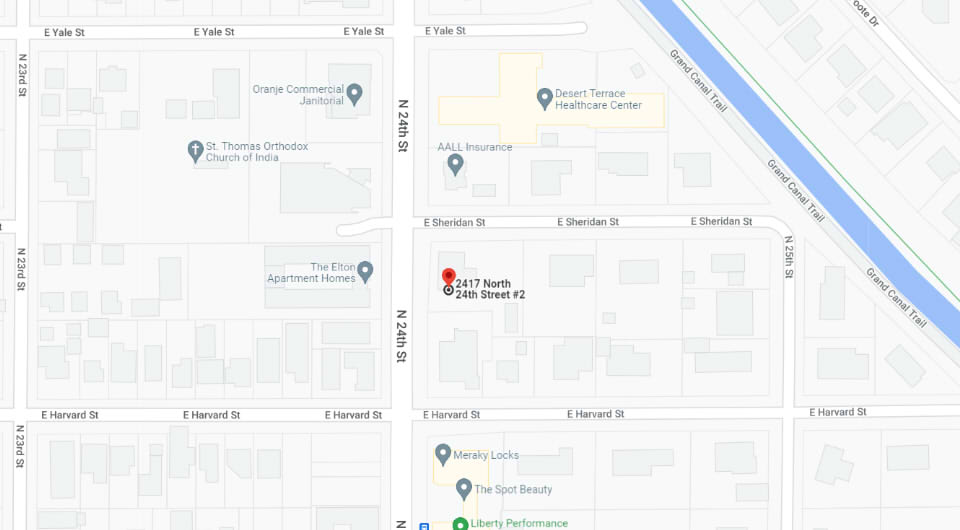Your smile is one of your most precious assets, and entrusting its care to a dentist is an act of faith. Yet, when that trust is betrayed, and you find yourself suffering the consequences of dental malpractice, it can be a devastating and bewildering experience.
At Phoenix Personal Injury Attorney Law Firm, we understand that dental malpractice can have far-reaching consequences, impacting not only your physical well-being but also your emotional and financial stability. Our team of personal injury attorneys in Phoenix is here to guide you through this challenging journey and help you pursue the compensation you deserve.
What is Dental Malpractice?
Dental malpractice refers to instances where a dentist or dental healthcare provider causes harm or injury to a patient through a negligent act or omission. This harm can manifest as physical injury, pain and suffering, emotional distress, or financial loss.
Dental malpractice cases typically revolve around a breach of the standard of care expected from dental professionals, resulting in harm to the patient. Establishing a dental malpractice claim successfully typically involves collecting evidence, demonstrating a breach of the standard of care, proving a direct link between negligence and harm, and seeking compensation for the damages suffered.
Common Types of Dental Malpractice Cases
Dental malpractice cases can encompass a wide range of scenarios where dental professionals breach their duty of care to patients, leading to harm or injury. Here are some common types of dental malpractice cases:
- Misdiagnosis or delayed diagnosis — Dentists are responsible for accurately diagnosing dental conditions. When a dentist fails to promptly identify a dental issue or disease, it can lead to more extensive damage or complications. For example, a delayed oral cancer diagnosis can significantly reduce a patient's chances of successful treatment.
- Surgical errors — Dental procedures, including oral surgeries, implant placements, and extractions, require precision and skill. Surgical errors can occur when a dentist makes mistakes during these procedures, such as damaging nerves, perforating sinus cavities, or leaving foreign objects (like dental tools) inside the patient's mouth.
- Medication errors — Dentists may prescribe medications, such as antibiotics or painkillers, to manage pain or infections. Medication errors can include prescribing the wrong medication, incorrect dosage, or failing to consider a patient's allergies or potential drug interactions, leading to adverse reactions.
- Infections due to sterilization issues — Proper sterilization and infection control are critical in dental practices. If a dentist or their staff fails to follow adequate sterilization protocols, patients may be at risk of contracting infections, including bloodborne diseases like HIV or hepatitis.
- Failure to obtain informed consent — Dentists are typically required to obtain informed consent from the patient before performing any dental procedure. This process involves explaining the nature of the procedure, potential risks, alternatives, and expected outcomes. Failure to obtain informed consent can lead to legal issues.
- Unnecessary procedures — Some dental professionals may recommend and perform unnecessary dental work to generate additional revenue. Patients may be subjected to unnecessary fillings, root canals, or other procedures that can cause physical harm and financial loss.
- Nerve damage — During dental procedures, such as root canals or extractions, dentists must exercise extreme care to avoid damaging nerves in the mouth and face. Nerve damage can result in persistent pain, numbness, or loss of sensation.
- Anesthesia complications — Administering anesthesia is a common part of many dental procedures. Errors in anesthesia dosage or administration can lead to adverse reactions, including allergic reactions or anesthesia awareness.
- Orthodontic malpractice — Orthodontists who fail to properly plan and execute orthodontic treatments like braces can cause misalignment, bite issues, and jaw problems.
- Cosmetic dentistry errors — Patients seeking cosmetic dental procedures like teeth whitening, veneers, or dental implants may experience unsatisfactory results or complications if the procedures are not performed correctly.
Consulting with an experienced personal injury attorney specializing in dental malpractice cases is essential to pursue a dental malpractice claim successfully. They can evaluate the specific circumstances of your case, gather evidence, and help you seek compensation for the damages and suffering you have experienced due to dental malpractice.
What are the Potential Indicators of Dental Malpractice?
Recognizing potential indicators of dental malpractice is crucial for individuals who suspect they may have received substandard dental care. While not every complication or issue is indicative of malpractice, certain signs and circumstances should raise concerns.
Here are some potential indicators of dental malpractice:
- Persistent pain or discomfort — Experiencing persistent or severe pain, discomfort, or complications following a dental procedure can be a sign that something went wrong. This could include pain that does not improve or worsen after a procedure.
- Unexplained infections — Developing infections, abscesses, or other oral health problems that were not present before treatment may indicate improper sterilization, surgical errors, or other malpractice issues.
- Unsatisfactory results — If the outcome of a dental procedure, such as a crown, bridge, or veneer, does not meet your expectations and significantly deviates from what was discussed with the dentist, it may suggest negligence or errors in treatment.
- Delayed healing — Delayed or impaired healing following oral surgery or dental procedures can be a sign of complications, inadequate aftercare, or surgical errors.
- Excessive bleeding — Uncontrolled or excessive bleeding after a dental procedure may indicate that the dentist failed to address bleeding issues appropriately during or after surgery.
- Unusual swelling — Swelling that persists for an extended period or is more severe than expected after dental work can signal complications or infection.
- Numbness or tingling — Prolonged numbness or tingling in the mouth, lips, or tongue after dental procedures, especially those involving wisdom teeth extraction, may be a sign of nerve damage.
- Unexplained allergic reactions — Developing allergic reactions or adverse side effects from medications or materials used during dental treatment could indicate negligence in considering your medical history or allergies.
- Inadequate informed consent — If you were not provided with sufficient information about a procedure's risks, alternatives, and expected outcomes before treatment, it may suggest a failure to obtain informed consent.
- Sudden changes in dental health — Rapid deterioration of your oral health or the appearance of new dental problems following treatment may indicate errors in diagnosis or treatment.
- Unusual or excessive billing — Receiving bills for services not performed or being charged excessively for dental work may raise concerns about the dentist's ethical and professional practices.
- Lack of follow-up — Dentists should provide appropriate post-operative care and follow-up instructions. If your dentist fails to provide adequate aftercare guidance or follow up on your progress, it could be a red flag.
Remember that experiencing one or more of these indicators does not guarantee dental malpractice. However, suppose you suspect you have been a victim of dental malpractice. In that case, it is advisable to seek a second opinion from another dental professional and consult with an experienced personal injury attorney who specializes in dental malpractice cases. They can evaluate your situation, gather evidence, and help you determine if pursuing a malpractice claim is warranted.
Arizona Statute of Limitations for Dental Malpractice Claims
The statute of limitations for dental malpractice claims in Arizona sets a legal time limit within which a patient must file a lawsuit against a dental professional or healthcare provider for alleged malpractice. The specific time frame can vary depending on the nature of the claim and the circumstances.
Arizona's general statute of limitations for medical and dental malpractice claims is typically two years. This means that a patient generally has two years from the date of the alleged malpractice or the date they reasonably should have discovered the injury to file a lawsuit.
Arizona follows the "discovery rule," which means that the statute of limitations may start running from the date the patient discovered, or should have reasonably discovered, the injury or malpractice rather than the actual date of the treatment. This rule is particularly relevant when injuries or complications from dental malpractice are not immediately apparent.
If the patient is a minor (under 18 years of age) at the time of the alleged dental malpractice, the statute of limitations may be extended. Sometimes, the minor may have until their 20th birthday to file a claim.
How to Initiate a Dental Malpractice Claim
Initiating a dental malpractice claim in Arizona involves several steps, and it is essential to follow a structured process to increase your chances of a successful outcome. Here is a general guide on how to initiate a dental malpractice claim in Arizona:
- Seek immediate medical attention — If you experience complications or believe you are a victim of dental malpractice, it is crucial to seek immediate medical attention to address your health and well-being.
- Document your case — Maintain thorough records of all relevant information related to your dental treatment, including dental records, medical bills, photographs, and correspondence.
- Consult with an attorney — Contact a personal injury attorney who specializes in dental malpractice cases in Arizona. An experienced attorney can evaluate the strength of your case and provide legal guidance. Many attorneys offer free initial consultations.
- Evaluate the merit of your claim — Your attorney will review your case to determine whether there is a valid dental malpractice claim.
- Notice of claim — In Arizona, you may need to provide notice to the healthcare provider or their insurer before filing a lawsuit. This notice typically includes details about the alleged malpractice and the damages you are seeking. Your attorney can help you prepare and submit this notice in compliance with Arizona law.
- Negotiation and settlement — After the notice of claim is submitted, there may be negotiations between your attorney and the defendant's insurance company to reach a settlement. Many dental malpractice cases are resolved through negotiated settlements.
- Filing a lawsuit — If a settlement cannot be reached, your attorney will file a lawsuit on your behalf. This involves drafting a complaint outlining your allegations and the relief you seek.
Stages of a Dental Malpractice Lawsuit
A dental malpractice lawsuit typically progresses through several stages, from the initial filing to the resolution of the case. Here are the key stages of a dental malpractice lawsuit:
- Filing a complaint — The plaintiff (the injured patient) files a complaint against the defendant (the dentist or dental professional) in the appropriate Arizona court. The complaint outlines the allegations of dental malpractice, the injuries suffered, and the relief sought.
- Service of process — After filing the complaint, the plaintiff must serve the defendant with a summons and a copy of the complaint. This notifies the defendant of the lawsuit and gives them a specific period to respond.
- Response by defendant — The defendant responds to the complaint by filing an answer. In the answer, the defendant either admits or denies the allegations and may raise affirmative defenses.
- Discovery phase — During the discovery phase, both parties can send written questions (interrogatories) to each other to gather information about the case. Depositions may also be given. Depositions involve sworn, out-of-court testimony given by parties, witnesses, and experts. It allows both sides to question witnesses and gather evidence. Moreover, both parties may request relevant documents, such as dental records, medical records, and expert reports. Additionally, each side may consult with and retain expert witnesses who can provide professional opinions regarding the standard of care and whether it was breached.
- Pretrial motions — During this phase, either party may file a motion for summary judgment. The defendant may ask the court to dismiss the case if there is no genuine dispute about the material facts or the application of the law. The plaintiff may ask the court to award damages if there is more than enough evidence of the defendant’s liability. Parties may also file motions to limit or exclude certain evidence from being presented at trial.
- Mediation or settlement negotiations — Before proceeding to trial, the parties may engage in mediation or settlement negotiations to resolve the case. Mediation is a non-binding process where a neutral mediator assists the parties in reaching a mutually agreeable settlement.
- Trial — If a settlement is not reached, the case proceeds to trial. Both sides present their evidence, witnesses, and arguments to a judge or jury during the trial.
- Verdict — The judge or jury renders a verdict, which can be in favor of the plaintiff (awarding damages), the defendant (finding no liability), or a combination of both.
- Appeals — If either party is dissatisfied with the trial outcome, they may file an appeal to a higher court to review the case.
- Resolution — The case is considered resolved when a final judgment or settlement agreement is in place.
The duration and complexity of each stage can vary widely depending on the specifics of the case, the court's schedule, and other factors. Suppose you are pursuing a dental malpractice lawsuit in Arizona. In that case, working closely with an experienced dental malpractice attorney who can guide you through each stage of the process and advocate for your best interests is crucial.
Potential Compensation Options for Dental Malpractice
Victims of dental malpractice may be entitled to various forms of compensation, depending on the specifics of their case and the harm they have suffered. Compensation options for dental malpractice cases in Arizona may include the following:
- Medical expenses — Compensation for all reasonable and necessary medical and dental expenses related to correcting or treating the harm caused by malpractice. This may include the cost of additional dental procedures, surgeries, medications, and rehabilitation.
- Lost wages — Compensation for income lost due to time off work for medical treatment, recovery, or follow-up appointments.
- Pain and suffering — Compensation for physical pain, emotional distress, and mental anguish resulting from dental malpractice. These damages are not easily quantifiable and can vary significantly from case to case.
- Loss of enjoyment of life — If the malpractice results in a decreased quality of life or prevents the victim from enjoying activities they previously did, they may be eligible for compensation.
- Loss of consortium — In cases of severe harm, a spouse may be eligible for compensation for the loss of companionship, affection, and support from the injured party.
- Punitive damages — In extreme cases where the defendant's conduct was especially reckless, willful, or wanton, punitive damages may be awarded. These damages are intended to punish the defendant and deter similar misconduct in the future.
- Future damages — If the dental malpractice results in long-term or permanent injuries or disabilities, victims may be entitled to compensation for future medical expenses and future loss of income or earning capacity.
- Wrongful death damages — In cases where dental malpractice leads to the patient's death, surviving family members may pursue a wrongful death claim, seeking compensation for funeral expenses, loss of financial support, and the emotional impact of the loss.
The specific compensation awarded in a dental malpractice case will depend on the case's unique circumstances, the severity of the injuries, the extent of the negligence, and other factors. Additionally, Arizona law may limit the amount of compensation that can be awarded in certain cases.
Find a Phoenix Malpractice Lawyer Near Me
At Phoenix Personal Injury Attorney Law Firm, we understand the physical, emotional, and financial toll dental malpractice can take on individuals and their families. Our commitment is to be your advocate, voice, and source of support during these challenging times.
We have the expertise, experience, and dedication to navigate the complexities of dental malpractice cases and pursue the compensation you deserve. If you or a loved one has been a victim of dental malpractice in Phoenix, do not hesitate to contact us at 602-641-9589 for a free consultation.










